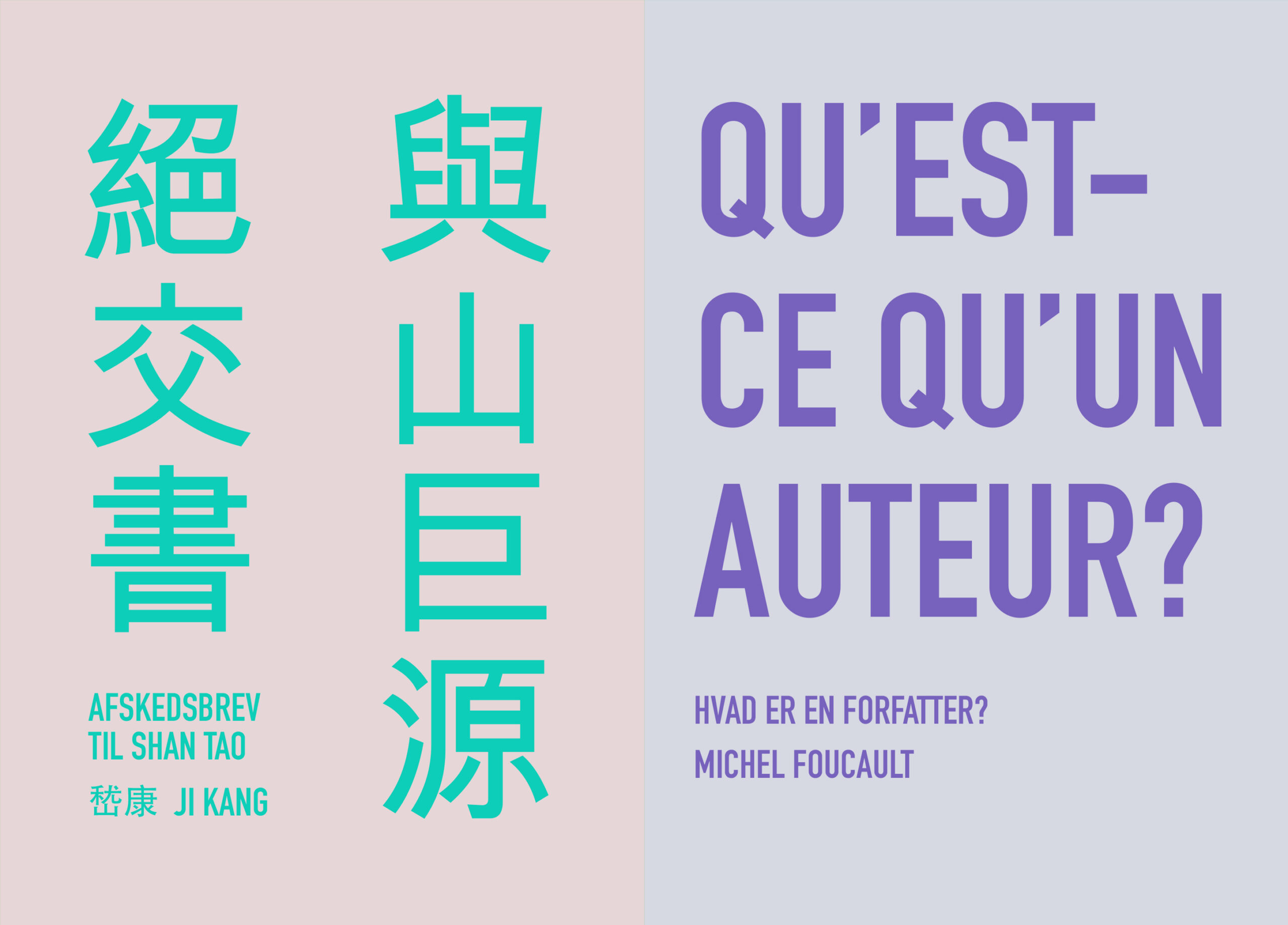
To mark the Danish publication of "Letter to Shan Tao Severing Our Relationship" by Ji Kang and "What Is an Author?" by Michel Foucault, Art Hub and the artist/publisher Kasper Hesselbjerg invite you to a reception and a discussion about the two publications.
Kasper Hesselbjerg has just completed a residency at Art Hub. His art centres around the interrelationship between sculpture, image and text. He has also published a number of books. The two current publications from Forlaget Emancipa(t/ss)ionsfrugten are the first in a new series.
At the reception, Hesselbjerg will talk about the ideas that went into the series, explain how the two works are interrelated and describe the raison d’être of publishing them as part of his artistic practice.
The two translators of the books will also provide an introduction to the works: Peter Borum who translated "What Is an Author?" from French and Peter Damgaard, who translated "Letter to Shan Tao Severing Our Relationship" from Chinese. Neither of the two works has previously been translated into Danish.
The researcher, curator and writer Anne Kølbæk Iversen will act as moderator for the discussion.
~
The talk will be in Danish.
The two books will be for sale at the reception or you can order them later from your favourite bookshop.
Admission to the reception and talk is free, but if you wish to attend, you must sign up. You can do so via Billetto.
A FEW WORDS ABOUT KASPER HESSELBJERG:
Kasper Hesselbjerg (b. 1985) graduated from the Royal Danish Academy of Fine Arts in 2013. His art centres around the interrelationship between sculpture, image and text. He examines the premises for our encounter with objects in our everyday life and how, together with them, we can create meaning.
A FEW WORDS ABOUT "LETTER TO SHAN TAO SERVERING OUR RELATIONSHIP":
“If you continue to pressure me to join the civil service - in the expectation that we will rise together through the ranks and benefit and please one another - then I will certainly lose my mind. Unless you harbour profound hatred for me, I cannot imagine you would wish to go that far.”
Ji Kang (223-262) was a Chinese poet, musician and Taoist philosopher. He is famous as one of ‘The Seven Sages of the Bamboo Grove’ who, during a period of political unrest, withdrew from society, candidly discussing art and philosophy, writing poetry, playing music and drinking wine. Their retreat reflected not only their desire to escape intrigue, corruption and a ‘bureaucratic’ existence, but also a longing to restore things to their natural balance. These gatherings are regarded as a possible breeding ground for the concept of ‘free speech’ (qingtan), the aim of which was a kind of spiritual discussion devoid of pragmatic considerations. It was, therefore, fundamentally at odds with the prevailing ideals of the age. In his famous letter, translated and introduced here by Peter Damgaard, Ji Kang explains why he must say no to the position Shan Tao allegedly intends for him, and why he must sever their connection. The letter is a defence of individual freedom, raising questions about how we relate to a given social structure, and what as individuals we can and cannot accept.
A FEW WORDS ABOUT "WHAT IS AN AUTHOR?" BY MICHEL FOUCAULT:
“What one should do was identify the space thus left empty by the author’s disappearance, follow the distribution of lacunae and cracks, and look for the locations, the free functions that this disappearance reveals.”
All texts are written, but not all texts have authors. That is the thesis of Michel Foucault in his lecture ‘What Is an Author’ (1969). To regard writers as authors is to consider their text in a particular way. It amounts to asking certain questions and expecting certain answers. These questions often seek to decode the author’s intention. But this pursuit of origin only leads us astray. Instead, Foucault proposes that we let the concept of the author’s role replace the idea of the author as a person. The lecture can thus be regarded as an attempt to answer some of the questions that remained after Roland Barthes’ essay ‘The Death of the Author’ (1967).
MORE ABOUT THE PUBLISHING COMPANY
www.emancipatssionsfrugten.org







